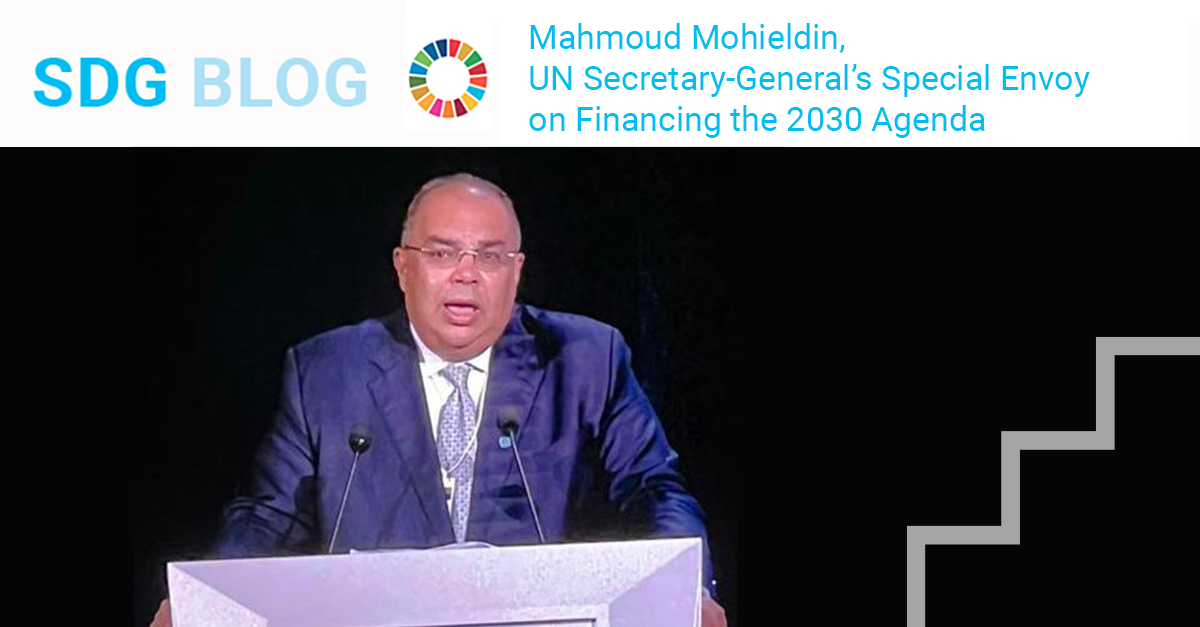SDG Blog

Financing for the way forward for sustainable development
By Mr. Mahmoud Mohieldin, UN Secretary-General's Special Envoy on Financing the 2030 Agenda for Sustainable Development
As we enter the third year of the pandemic, the world faces gross inequalities, a climate crisis and an economic depression not seen in decades. Worse still, the conflict in Ukraine will be a major blow to the global economy. Once again, developing countries least able to cope with the impacts of these interrelated and cascading crises will be hit hardest.
While some parts of the world are picking up the pieces and slowly recovering, many others are being pushed further behind. Developing countries have only 24 COVID-19 vaccine doses per 100 people, versus 148 doses per 100 people in developed countries. By the end of 2023, the size of the economy in one out of five developing countries will still be below pre-pandemic levels, compared to developed countries returning to pre-pandemic growth paths. The war in Ukraine may also push an additional 40 million people into extreme poverty, on top of the approximately 120 million pushed into poverty over the past two years.
Before the war in Ukraine, 44% of the developed economies and 71% of developing economies were experiencing a more than 5% rise in inflation rates. Now, with hikes in energy and food prices and increased shipping and insurance costs, inflation will grow more acute, especially in developing countries that rely heavily on food and fuel imports from the two countries at war.
45 African and least developed countries import at least one-third of their wheat from Russia or Ukraine—while 18 of those countries import at least 50%. In my own country of Egypt, this number reaches over 80%. As occurred at the start of the Arab Spring and the food riots of 2007-2008, this confluence of factors is creating a perfect storm for political instability and unrest, not only in the Arab Region, but across the world.
Faced with the three threats of “food, fuel, and finance”, many emerging markets and developing countries now face a dilemma: borrow and risk a debt crisis or choose austerity and risk a development crisis. The "great financing divide” – the inability of poorer countries to borrow affordably for investment – has been a key driver of developing countries being unable to respond to the pandemic. African countries are paying five to eight times the interest cost on their borrowing compared to developed countries. About 60% of LDCs and other low-income countries are now assessed at being in high risk of debt distress or in debt distress, up from 30% in 2015.
To build back better, the United Nations’ Secretary-General has put forward an ambitious agenda - Our Common Agenda-- with financing for development one of its main pillars for action. Ensuring sustainable and inclusive development for all people and countries, including the poorest, is vital for global economic and social progress. To get there, the world needs to act fast on two fronts: one, ensuring all countries have the immediate fiscal space to survive today’s multiple crises, and two, promoting solutions to address the systemic flaws in our global financial architecture that allowed the COVID-19 crisis to spiral into the full-fledged humanitarian crisis it became in the first place.
First, an integrated, holistic approach to sustainability of implementation must be taken, with climate action firmly placed within the context of the 2030 Agenda for Sustainable Development. This is embodied in the interconnectivity and indivisibility of the 17 SDGs, on which I had the honor to contribute to in various discussions since the Conference on Sustainable Development was held in Rio de Janeiro in 2012. Now, more than ever, stakeholders need to work together to minimize trade-offs and increase synergies between different, and often competing, sector-focused goals.
Second, SDG-based budgeting should be developed as the starting point at home to mobilize domestic resources and channel them towards achieving the SDGs. Strengthening public financial management and budget execution can help maximize the effectiveness of government expenditure. Integrated national financing frameworks (INFFs) can help to align financing policies, budgets, and strategies with national investment priorities and sustainable development strategies. Effective implementation of SDG budgeting could not only help governments to set priorities and avoid unnecessary overlap or coordination failure, but can be also helpful for international financial institutions, the private sector and other stakeholders in identifying potential areas of cooperation.
Last but not least, data systems for SDG progress, especially in the increasing digitalized world, are needed to guide our policymaking, identify priorities, determine the feasibility of projects and assess their performance. We need investment in data innovation and strengthened systemic statistical capacity to obtain more accurate, timely and comprehensive data to make the SDGs an action-oriented framework that can drive policies and programmes in real time for all people.
The world merits a recovery that lives up to the 2030 Agenda’s principle of leaving no one behind. As we call for closing vaccine and fiscal gaps in our economic stimulus packages, and for increasing support to countries’ suffering the brunt of the impacts of the war in Ukraine, our focus must be on directing investments to foster inclusive, sustainable, and resilient growth. We need to invest our way out of today’s crises, while reducing inequality and increasing resilience against the next one.
* The views expressed in this blog are the author’s and do not necessarily reflect the opinion of UN DESA.
 Welcome to the United Nations
Welcome to the United Nations